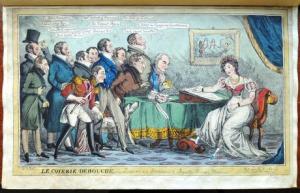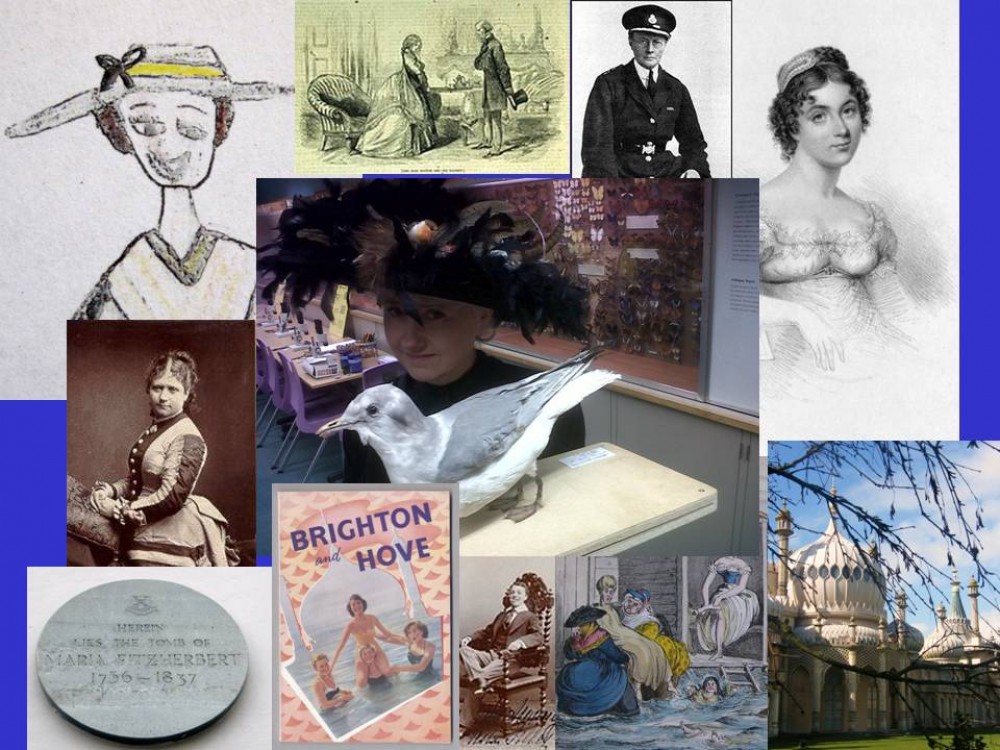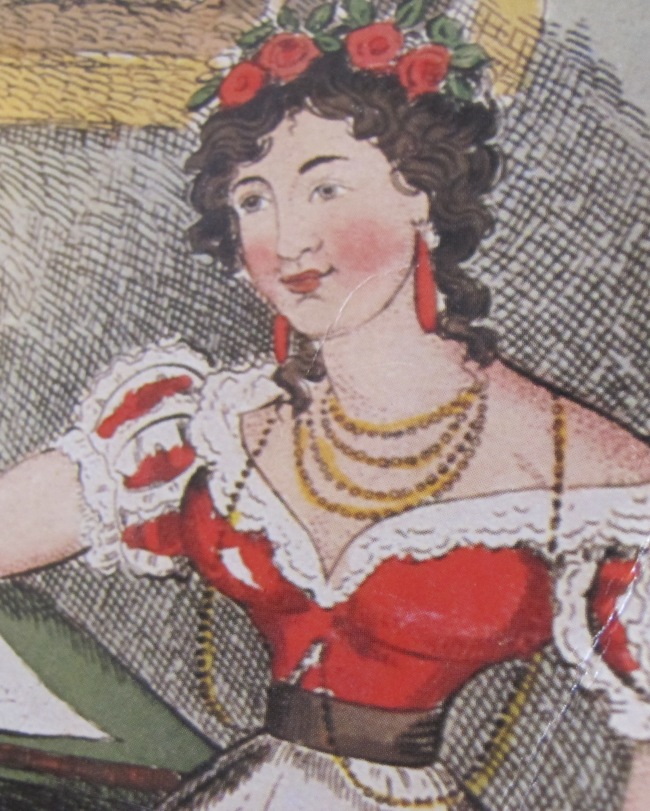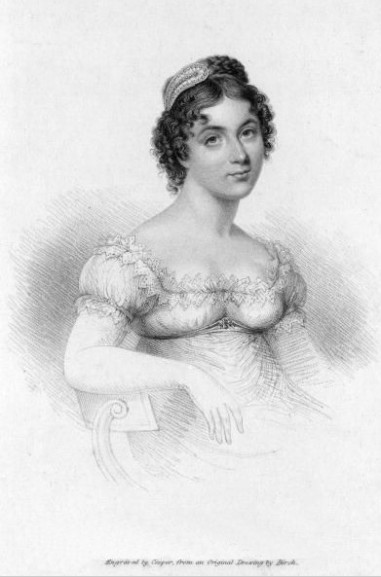When planning my walking tours, I always over-plan to a ridiculous degree and end up trying to include far more women than it’s ever possible to talk about in an hour and a half. I always have a few ‘spare’ women in my file should I zip through fast and end up with nothing to say (never happened), leaving me with the problem of having to choose which women to mention and which to leave out. I suppose it’s a bit like the dreaded PE lesson team pick at school. Remember standing in a line in the changing rooms while the ones who were good at sport picked people out for the netball team? Always being the last one to be picked, this was never fun for me. But I’ve just realised being the picker isn’t that easy either. This year, I found myself constantly leaving out one of my favourite women with links to Brighton. The least I can do is introduce her here… So welcome, and apologies it’s taken so long, to Harriette Wilson (1786 – 1845), the most dazzling courtesan of the Regency era, a woman who captivated, charmed and dazzled her way to the heart of fashionable society, only to shock, anger and terrify her way back out again.
‘I shall not say how and why I became, at the age of fifteen, the mistress of the Earl of Craven.’ Begins the first page of her Memoirs. ‘Whether it was love, or […] the depravity of my own heart, or the winning arts of the noble Lord, which induced me to leave my paternal roof and place myself under his protection, does not now much signify…’ From the first paragraph we know this isn’t just another staid celebrity biography. ‘I resided on the Marine Parade at Brighton…’ she informs us next and goes on to describe how the ‘winning arts’ of paramour Lord Craven have now dwindled to an annoying habit of drawing cocoa trees for her entertainment. ‘It was, in fact, a dead bore.’ . She moves on to an unflattering description of his choice of sleepwear. ‘Surely, I would say, all men do not wear those ugly cotton nightcaps; else all women’s illusions had been destroyed in the first night of marriage.’ This voice, frank, dry, knowing, allows us to see why Harriette was, in the sprawling, sparkling Regency demi-monde at least, one of the most feted women of her age.
Far from being prostitutes, courtesans like Harriette weren’t coveted for their sexual availability alone, but for their company, their style, and the cachet they would bring to a man’s reputation. Only the very wealthy could afford their company. For the Regency gentleman around town, having Harriette on your arm would scream Rich! Powerful! Virile! – an early nineteenth century equivalent of dangling the keys to a Ferrari in your friends’ faces. The most successful courtesans were clever, accomplished, witty, able to hold their own in conversation, a sort of alpha girlfriend who charged for her time. For a man in pre-Victorian, anything-goes London, there was nothing seedy or shameful about being seen at the opera with a woman like Harriette and, unlike women, men could slip easily between the above-board world of the respectable married family-man and the rowdy, gossipy, heavy drinking and gambling milieu of the dandies. Lesley Blanch writes in her introduction to Harriette Wilson’s Memoirs (Century, 1985) ‘The courtesan was expected to provide all the shades of companionship without the oppressive limitations and implications of marriage. She offered not only the bed but the sofa, the dinner-table and the salon – all save the nursery and the kitchen.’ So, all the fun of a relationship without the hard bits. Many courtesans were relatively high born but were simply surplus daughters or had disgraced themselves out of the marriage market in some way.
Harriette had had a boarding school and convent education. Twice she attempted to hold onto a proper job as a music teacher in elegant girls’ boarding schools. Twice she ran away, finding the governess’s life deadly dull. The second time she came home after her career at a school in Newcastle upon Tyne stalled, her father beat her. Faced with the option of a life of ‘crippling dullness’, she took her life into her hands and left home, Lord Craven providing a convenient if dull launchpad.
You can see the attraction at a time when the main options for women in Harriette’s position were either to become a stay-at-home wife for a husband chosen for you or a governess (a job that enjoyed no esteem, respect or rights). If you played your cards right as a courtesan and attracted the right man, you could command a lavish lifestyle. Clothes, jewellery, appropriate accommodation at a fashionable address, the latest carriage, even a pension could be forthcoming. Unlike prostitutes courtesans never solicited, they were sought after and prospective suitors of Harriette were rigorously ‘interviewed’.
One man who – initially – didn’t make the grade was George, Prince of Wales, the future Prince Regent. Harriette approached him during that first stay on the Marine Parade while the Prince was in town visiting his Marine Pavilion, the predecessor of the Royal Pavilion. ‘I wonder, thought I, what sort of a nightcap the Prince of Wales wears…’ she tells us. ‘A sheet of paper, covered with Lord Craven’s cocoa trees, decided me…’ She began a letter to the Prince. ‘I am told that I am very beautiful., so, perhaps, you would like to see me […] if you believe you could make me in love with you, write to me…’ Amused, the Prince wrote back suggesting a meeting in London. This wasn’t good enough for Harriette. ‘Sir, to travel fifty-two miles, this bad weather, merely to see a man […] would, you must admit, be madness, in a girl like myself, surrounded by humble admirers…’ she wrote in response. ‘…if you can do anything better , in the way of pleasing a lady, than ordinary men, write directly: if not, adieu, Monsieur le Prince.’
History hasn’t recorded what the Prince, the most eligible bachelor in the country and not used to having women turn him down, said upon receiving Harriette’s snub.
The most shocking thing that Harriette did, however, came much later. In 1825, about to turn forty, she found her fortunes fading. Many of the men who had in the past promised her a pension as part of the deal had conveniently forgotten about her. At her wits’ end, she hit upon a way to make them pay up. She’d write her memoirs. And she’d hold nothing back. She’d give the men concerned notice and if they were worried about the most minute details of their relationships with her being made public, well, they could pay to be missed out. Why not? She’d lived by putting a price on her attractiveness, so why not now charge for her discretion too? The Henry Heath cartoon below shows what happened…
 is
is
A positive stampede of men, wanting to pay the £200 the publisher was charging to ensure anonymity. Barricades had to be erected outside Stockdale’s the publishers to keep them at bay. The Memoirs were published in sections so men would have known when their shaming was nigh. It was one thing being linked to Harriette in the past but no one wanted the warts-and-all details of their relationship with her revealed for all the world to know. ‘Push any man into the streets in his dressing gown and nightcap and he will be laughed at,’ explained the London Magazine. Famously, the Duke of Wellington refused to have anything to do with it, declaring ‘publish and be damned!’ Consequently the hero of Waterloo does not emerge well from the Memoirs. ‘Rather like a rat-catcher’ is how Harriette describes his looks, and his pillow talk was ‘like sitting up with a corpse’. What Harriette did, having played power games with men all her life, was to snatch it back – and how – in the world’s first ever kiss and tell. Harriette grew rich, making ten thousand pounds out of her Memoirs, which were a best seller for years (before the Victorians relegated them to the top shelf). But she was never forgiven. When she returned to London in 1830 (she’d been living in Paris) the city cut her dead. The price of playing the men at their own game? At the time, for a woman to write frankly and unashamedly about sex – and then to do well out of it – was considered depravity of the worst type. If she’d been born today she’d probably be at the helm of an incredibly successful business. For pluck and entrepreneurial skills, for sticking to her principles, even if they were vastly different from the ones of everyone else at the time (and simply for telling the most eligible man in Britain she couldn’t be bothered to see him because the weather was bad), I think Harriette deserves the title Most Notorious Woman of Brighton.


